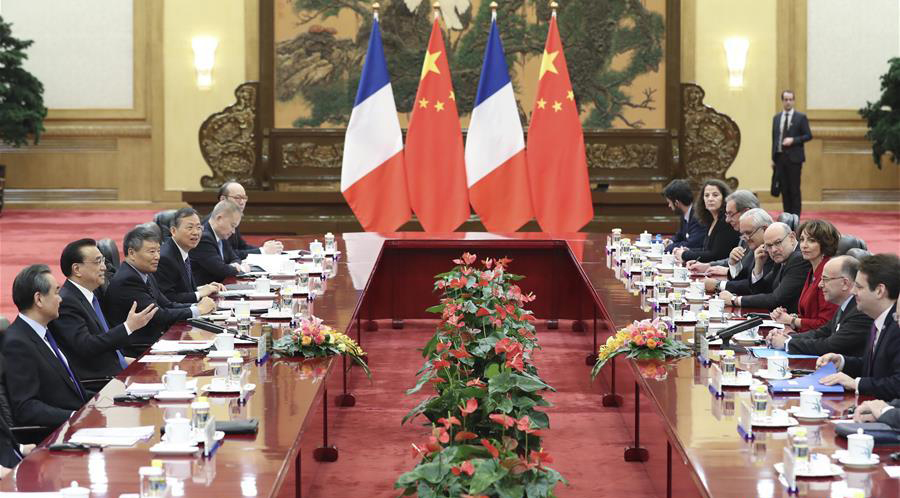Media Report

- The Associated Press reports: "China's No. 2 leader expressed hope Tuesday that disputes with U.S. President Donald Trump's government can be settled amicably and warned a 'trade war would benefit nobody.' Despite Trump's promises to raise duties on Chinese goods, Premier Li Keqiang said Beijing has a 'stable, optimistic outlook' on trade with the United States. Li took the unusual step of making an impromptu statement to reporters during an appearance with his French counterpart, Bernard Cazeneuve. 'Let the figures do the talking,' the premier said, citing American jobs supported by U.S.-Chinese trade. 'We have faith that, with mutual respect and on the model of cooperation through equality, issues of trade friction can be resolved amicably,' Li said. 'A China-U.S. trade war would benefit nobody, (and) would not benefit the world.'...Earlier Tuesday, the Chinese commerce minister delivered a similar message at a news conference, appealing to Washington to cooperate in promoting trade and a global economic recovery. Gao Hucheng urged Washington to 'properly solve' disputes through 'dialogue and cooperation.' He argued both sides have benefited from what has grown into the world's biggest trading relationship. 'A trade war should not become an option,' Gao said. 'If the two sides fight, all will be hurt.' "
- The Washington Post reports: "A prefecture in China's far western Xinjiang region is requiring all vehicles to install satellite tracking systems as part of stepped-up measures against violent attacks. Traffic police in Bayingolin Mongol Autonomous Prefecture announced the regulation on Sunday, shortly after thousands of heavily armed police paraded in the Xinjiang capital and ruling Communist Party officials vowed to ramp up their campaign against separatists and Islamic militants. The vehicle-tracking program in Bayingolin will utilize China's homegrown Beidou satellite system, launched in recent years to reduce China's reliance on U.S.-based GPS providers for sensitive applications. Authorities said they will also track cars using RFID technology embedded in license plates. 'In recent years, the terrorist situation around the world has become severe, and cars are the main means of transport for terrorists,' said prefectural authorities in an online statement. Authorities aimed to register and track up to 20,000 vehicles, the statement said. Gas stations will only serve cars equipped with the tracking system, according to a separate local news report. Police officials in the prefecture confirmed the tracking program to the AP on Tuesday but declined to answer questions."
- The Diplomat comments: "We don't yet have a full sense of how the Trump administration will manage intellectual property disputes with China, but we do know that Trump just won a big IP victory for himself. After years of effort, Trump managed to acquire a trademark for building construction services, after China's trademark office invalidated the claim of an acknowledged squatter. Dozens of other trademarks claimed by Trump remain in dispute, and could also come under his control in the near future. There are unquestionably serious conflict of interest issues associated with Trump's recovery of his trademark rights in China...However, to the extent that Trump's litigation forces action on the part of the Chinese authorities, it also has the potential to open greater space for the litigation of U.S. intellectual property rights in China. The Chinese government, under both domestic and international pressure, has worked hard to develop a framework for the protection of the various kinds of intellectual property rights (patents, trade secrets, trademark, copyright). Trump's legal claims have been processed within this framework, albeit in non-transparent ways...In either case, there is little reason to believe that U.S. policy toward the protection of its IP in China will benefit from President Trump's effort to win individual trademark cases."
Calendar
- 2017-02-20 Chinese Bank Cleanup Plan Could Leave a Mess
- 2017-02-19 US carrier starts 'routine' patrols in South China Sea
- 2017-02-17 Tillerson Urges China to Confront North Korean Provocations
- 2017-02-16 How Americans and Chinese view their countries and each other, in three charts
- 2017-02-15 Killing of Kim Jong Un’s Brother Intrigues North Korea’s Estranged Ally China
- 2017-02-14 China's credit growth poses challenge, but tightening seen gradual
- 2017-02-13 North Korea: missile test success claim as China rejects US criticism
- 2017-02-12 RPT-China gets an early win off Trump, but many battles remain
- 2017-02-10 Beijing’s Patience Pays Off With Trump’s Reaffirmation of ‘One-China’ Policy
- 2017-02-09 China Praises Trump's Letter to Xi, Belated Well-Wishes
News
- The Associated Press Chinese premier appeals to Washington to avoid 'trade war'
- The Washington Post Prefecture in China's Xinjiang to track cars by satellite
- The New York Times Is China Pushing Trump to Talk to North Korea?
- The Guardian Australia should not join US in South China Sea operations, says retired defence chief
- Bloomberg RBA Predicts Rising Resource Exports Will Spur Growth, Sees China Uncertainty
- Reuters China opposes U.S. naval patrols in South China Sea
- The Financial Times Rules threaten $100bn worth of China share sales
- The New York Times Chinese Security Forces Rally in Xinjiang in a Show of Power
- Reuters Stocks shrug off HSBC, rise on punchy euro zone growth signals
- Bloomberg China to Draft Rules to Rein in Asset Management Risks
- The Associated Press UN health agency 'vigilant' about China bird flu outbreak
- BBC Miners boosted by commodity prices
- The Financial Times China's Geely and France's PSA bid for Lotus owner Proton
Commentary
- The Diplomat How Will Trump Handle Intellectual Property Disputes With China?
- Forbes Vietnam Is Getting Closer To Its Rival China Because Neither Side Trusts Trump
- Fortune China's Cash-Rich Investors May Be Losing Their Cachet
- Quartz China is warning Lotte Group against letting a Korean golf course become a missile defense site
- The Washington Post Can the Chinese government really control the Internet? We found cracks in the Great Firewall
- The Wall Street Journal: Opinions The Logic of Trump's Foreign Policy
- Barron's How Trump Makes China's Car Makers Great
